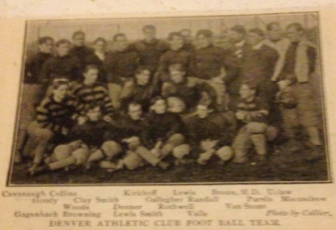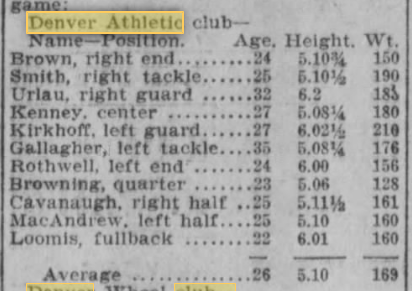Page 1 of 2
Chicago A.A. Question (1891? - 1898?)
Posted: Thu Oct 12, 2023 4:52 pm
by TanksAndSpartans
The last season I could find that the Chicago Athletic Association football team competed was 1898. Does anyone know for sure that's their last season? And if so, why did a successful team, with a successful club behind it, that continued to compete in other sports in 1899, not field a football team?
I couldn't find anything on it in the newspapers. Mark had the one PFRA article on the team here:
https://profootballresearchers.com/arch ... 06-958.pdf, but it didn't get into their demise.
I was specifically looking at the career of Herman Kerkhoff who headed to Denver to play the '99 season. Thanks.
Re: Chicago A.A. Question (1891? - 1898?)
Posted: Fri Oct 13, 2023 7:39 am
by Ken Crippen
Have you talked to Joe Ziemba?
Re: Chicago A.A. Question (1891? - 1898?)
Posted: Fri Oct 13, 2023 8:29 am
by TanksAndSpartans
Thanks Ken. I appreciate the lead. I just messaged him via the forum. I also pulled out his book and saw on page 9 that he does hint at an explanation. The C.A.A.'s big games were against the major colleges (Harvard, Yale, etc.) and that was exactly the time that it was falling out of favor for schools to schedule athletic clubs with grumblings about professionalism getting louder. He doesn't say it exactly that way, but his last mention I found of the C.A.A. explains Northwestern played them "in secrecy, so staunch was the prevalent distrust of any type of postgraduate football at the time." The season... 1898.
The explanation makes sense, but from my own research I didn't think '98 was that special - Yale played the Orange A.C. in 1901 for example, so I was wondering if there was some specific reason C.A.A. would have stopped playing.
Re: Chicago A.A. Question (1891? - 1898?)
Posted: Sat Oct 14, 2023 7:05 am
by DarinLHayes
I do know Joe was just into some research on the Chicago AA team for me a few weeks ago as he helped me with some history on Herman Kerkhoff's time in the Windy City in that era.
Re: Chicago A.A. Question (1891? - 1898?)
Posted: Sat Oct 14, 2023 7:10 am
by JameisBrownston
I'm just baffled to hear there were already pro teams as far afield as Denver in 1899.
Re: Chicago A.A. Question (1891? - 1898?)
Posted: Sat Oct 14, 2023 9:47 am
by TanksAndSpartans
JameisSaintston wrote: ↑Sat Oct 14, 2023 7:10 am
I'm just baffled to hear there were already pro teams as far afield as Denver in 1899.
This is a good article and the only one I know of discussing western teams from that era:
https://profootballresearchers.com/arch ... 05-138.pdf
Re: Chicago A.A. Question (1891? - 1898?)
Posted: Sat Oct 14, 2023 10:05 am
by TanksAndSpartans
DarinLHayes wrote: ↑Sat Oct 14, 2023 7:05 am
I do know Joe was just into some research on the Chicago AA team for me a few weeks ago as he helped me with some history on Herman Kerkhoff's time in the Windy City in that era.
Thanks Darin - we should touch base. Kerkhoff is the player that led me to wondering about the end of the C.A.A. Assuming the C.A.A. disbanded after the '98 season, I was also wondering what the draw of Denver was as opposed to heading east 3 seasons sooner.
Here's what the Denver team looked like right around the turn of the century:

- Screen Shot 2023-10-14 at 10.01.47 AM.png (145.57 KiB) Viewed 11046 times

- denver-01.png (118.47 KiB) Viewed 11046 times
Re: Chicago A.A. Question (1891? - 1898?)
Posted: Sat Oct 14, 2023 2:59 pm
by RyanChristiansen
Whenever I see talk about these early Chicago teams, I always think about organized crime, and I'm always drawn to whether a neighborhood boss or gambling crime ring had anything to do with a change in the status of a football team. My example is from much later, in the early 1920s, when the Titus Haffa Boosters played, and they were apparently named after a bigshot in Chicago who was an industrialist and politician associated with gangsters and bootleggers. Maybe there was a criminal element in 1898 that no longer found the games profitable from a shady standpoint.
Re: Chicago A.A. Question (1891? - 1898?)
Posted: Sat Oct 14, 2023 5:00 pm
by Joe Ziemba
There were two key reasons why the Chicago Athletic Association (CAA) dropped football in early 1899: money and ugly (although accurate) rumors of professionalism. Some members of the rather aloof organization noticed that the expenses for the operation of a widely-traveled football team were beginning to adversely affect the bottom line, while others complained that the team only played three home games since local college teams were reluctant to engage the more seasoned CAA athletes.
Basically, the CAA offered full “memberships” to the elite club to its outside athletes. It was revealed that, in addition to lost dues, the CAA invested $16,500 in 1897 and 1898 in “outside” athletics (primarily football). All of this came to a head during the election of new officers which was held on January 17, 1899. The “Regulars” party, fronted by one C.K. Wooster, favored abolishing outside sports and limiting its athletic program to ”regular” members only. The opposition “Members” party, led by William Hale Thompson, supported the current athletic system for all sports, including track and boxing, although it was likely that the football program would be deemphasized no matter which party succeeded.
Thompson, who was also the manager of the football team, was heavily favored in the election, but was trounced in the membership voting and the football program was immediately eliminated. Other sports continued, although the teams were composed strictly of “regular” members. Thompson, however, went on to later serve 12 years as the Mayor of Chicago, where he is now viewed as one of the most corrupt mayors in the history of Chicago, primarily because of his not-so-secret alliance with one Al Capone!
Re: Chicago A.A. Question (1891? - 1898?)
Posted: Sun Oct 15, 2023 6:13 am
by DarinLHayes
Joe Ziemba wrote: ↑Sat Oct 14, 2023 5:00 pm
There were two key reasons why the Chicago Athletic Association (CAA) dropped football in early 1899: money and ugly (although accurate) rumors of professionalism. Some members of the rather aloof organization noticed that the expenses for the operation of a widely-traveled football team were beginning to adversely affect the bottom line, while others complained that the team only played three home games since local college teams were reluctant to engage the more seasoned CAA athletes.
Basically, the CAA offered full “memberships” to the elite club to its outside athletes. It was revealed that, in addition to lost dues, the CAA invested $16,500 in 1897 and 1898 in “outside” athletics (primarily football). All of this came to a head during the election of new officers which was held on January 17, 1899. The “Regulars” party, fronted by one C.K. Wooster, favored abolishing outside sports and limiting its athletic program to ”regular” members only. The opposition “Members” party, led by William Hale Thompson, supported the current athletic system for all sports, including track and boxing, although it was likely that the football program would be deemphasized no matter which party succeeded.
Thompson, who was also the manager of the football team, was heavily favored in the election, but was trounced in the membership voting and the football program was immediately eliminated. Other sports continued, although the teams were composed strictly of “regular” members. Thompson, however, went on to later serve 12 years as the Mayor of Chicago, where he is now viewed as one of the most corrupt mayors in the history of Chicago, primarily because of his not-so-secret alliance with one Al Capone!
Excellent info as always Joe!